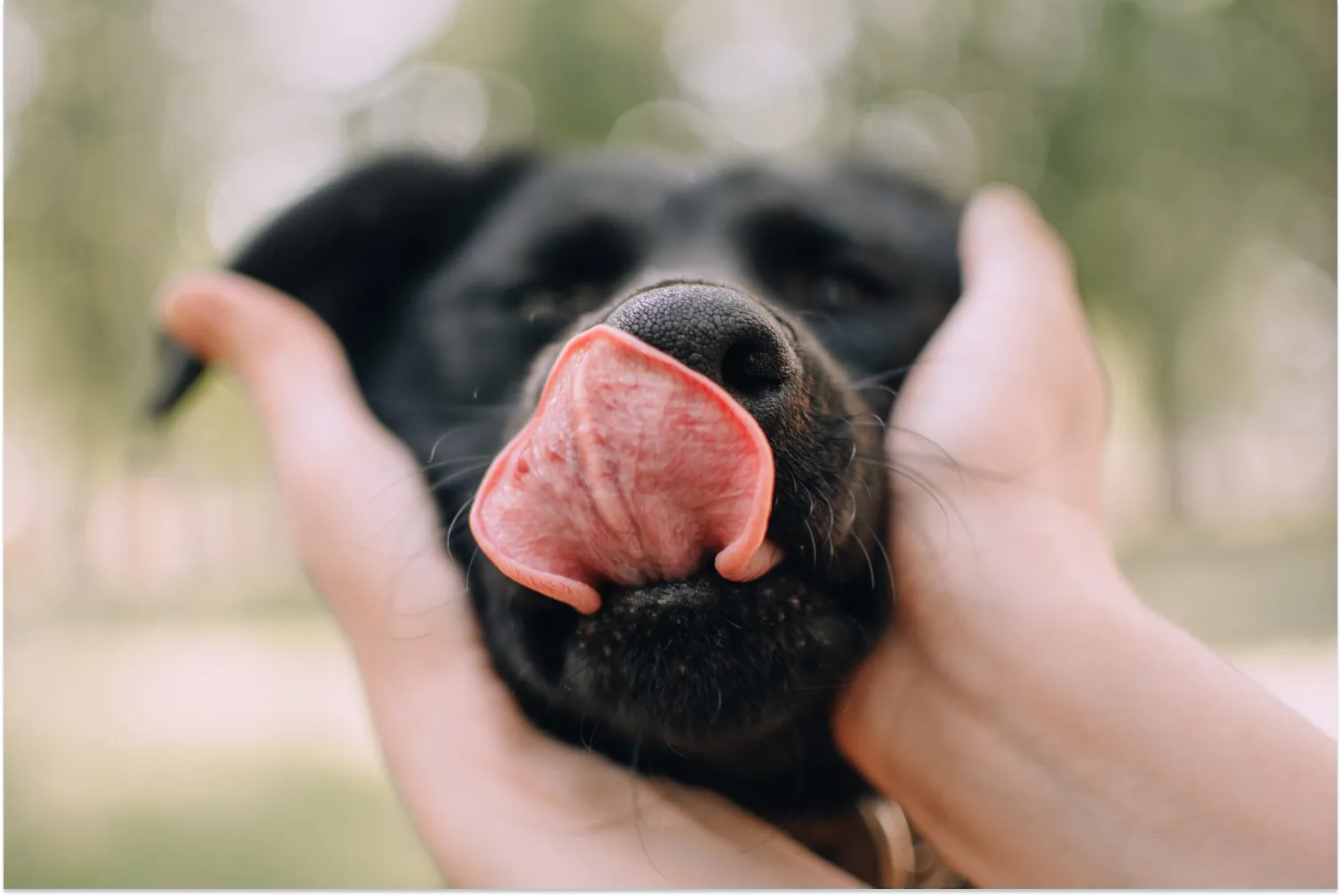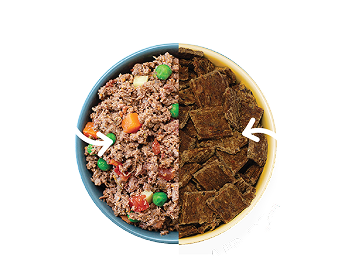
Why Does My Dog Lick Me All the Time?
We all love kisses from our pups; it's a sign of love, right? But there are times when it seems like the licking won’t cease.
Sometimes, they don’t limit their licking to just their humans either. The thought is, “Why does my dog lick so much?” Is it really just love?
Let’s dig a bit deeper to uncover and understand why your canine companion licks you and all other sorts of things.
What Does Dog Licking Mean?
So why do dogs lick in the first place? Licking has multiple purposes in the dog world. Licking is a normal, instinctive dog behavior; even species of wild dogs lick!
Grooming
Grooming comes in the form of licking for dogs; it is the only way they have to upkeep their coats (without their humans stepping in, of course). They will try to lick and nibble out anything stuck in their fur, such as burdocks or sticks.
This is also how they would clean an open wound or sore. However, if you notice them suddenly grooming obsessively, it may be time to visit your veterinarian to check things out.
Self-Expression
Licking is also a way dogs express themselves; it's a sign of affection. They learned to lick to express love and show affection from their mothers, who would lick them while they were puppies to keep them clean and fed.
As they get older, get adopted, and find their way to your home, they use this behavior learned from their mother to show their new parent affection. This can be between them and their humans or their dog siblings.
Licking releases endorphins that can help your pup feel calm and safe. It is also used to bond with their pack members to strengthen their relationship.
Communication
Licking along with body language is how they communicate. Dogs lick as a way of greeting, so when your pup excitedly licks you when you come home, it's a dog's way of saying, “Hi, welcome home!”.
For example, in a wolf pack, you may see them lick the muzzle of their alpha to show submission. Dogs can also lick to communicate with you; they can get your attention through their tongue.
Some smart pups even lick you because their water bowl is empty or if they’re hungry! Much like puppies do to their mothers.
Knowledge
We all know that a dog's sense of smell is impeccable. Licking/tasting is how they can learn about the world around them. They can learn about their social standing and how they find tasty snacks or stinky things like garbage. They can even learn that you are upset through your salty tears!
Enjoyment
Dogs can also lick because they enjoy it! They like the taste of their bones or chew toys. Your pup probably likes how your skin tastes, whether it's salty or from some yummy lotion you have on.
Licking and Health Issues
Licking can also communicate a dog's health status to us as pet owners. Some licking behaviors can point to a health issue.
As pet parents, paying attention to when and where they are licking and if it suddenly starts is important. This information can be extremely helpful to your veterinary team in addressing any medical issues that may be occurring.
If you see these signs, it may be time to have an appointment with your DVM to get your pup checked out. We’ll explore some medical or health issues that may present with licking as a symptom.
Though dogs like to clean their wounds, often they cannot stop themselves from continuously licking at a wound. When dogs lick at a wound non-stop, they can cause more damage to the skin and tissues and even introduce bacteria, leading to infection. There may even be a wound you can’t see, but you can identify it with them licking a lot.
Excessive licking can be a red flag for a dog that struggles with allergies. Generally, allergic pups will lick or chew their feet and overall seem itchy.
An array of things cause allergies. It could be the pollen outside, food, or both. Some pups are more prone to allergies just because of their breed.
We can also see dogs lick sore areas affected by joint issues such as arthritis. Often, these pups are geriatric, but sometimes, younger dogs may develop joint issues after an injury, trauma, or congenital deformity. Licking at these areas can be a sign that they are starting to become stiff, weak, and painful.
It's important to remember that some older dogs may also suffer from “cognitive dysfunction,” basically doggy dementia. They may lick excessively, pace around, and overall seem a bit confused or out of it.
Some other health issues that may appear are lip licking and/or drooling. This can be a sign that your furry companion is suffering from nausea or an upset stomach. It's also possible that they may be affected by some dental issues that can show up as licking and may include some bad breath!
Behavioral Issues and Licking
Dogs who are having behavioral issues exhibit different symptoms or signs. An anxious dog is often also an excessive licker. Typically, they lick obsessively to try to calm themselves, as we’ve learned that licking releases endorphins and dopamine, which help dogs cope with their anxiety.
Dogs can suffer from anxiety and disorders like obsessive-compulsive disorder(OCD). Anxious behavioral issues can be specific to issues with territorial aggression, resource guarding, sound sensitivity (like thunderstorms or fireworks), or separation anxiety.
Separation anxiety is a big struggle for many pups, especially since the pandemic, which kept a lot of pet parents at home. Once the world returned to a more normal state, these pups weren’t prepared for the big change of their favorite humans not being home all the time.
Dogs who suffer from separation anxiety can show destructive behaviors and may not tolerate a crate well. They will often start becoming anxious when their owner shows signs of leaving the house and may have difficulty settling when they come back home.
Anxiety or other behavior issues can be a big reason your pup won’t stop licking you. If you think your dog is affected by anxiety or behavior issues, it’s ideal to work with a behaviorist and dog trainer.
They can make a treatment plan to help dog owners learn what their dog needs specifically. This can range from training, exercise, medication, or all combined. Dog behavior can be confusing; having a tailor-made plan for your pup’s individual needs is the best way to figure out the root of the issue and tackle those behaviors.
Dogs lick if they are bored, too. Bored dogs can lead to anxious behaviors, so be sure to schedule plenty of time for exercise. This keeps your pup engaged and entertained and helps your puppy-parent bond even if they’re no longer young pups.
To Lick or Not To Lick
Since we’ve done a deep dive into why a dog licks, you’re probably wondering if it's something you should allow to happen. Licking is fine in moderation, such as grooming themselves, but when it becomes an obsession, you can draw a line.
Dogs that lick one area may form what’s called an “acral lick granuloma.” Typically, these dogs lick one area over and over again for hours, causing the skin to become irritated, raw, and sometimes even infected.
This can be caused by allergies, anxiety, injury, or joint pain. It is a lasting issue, often a lifelong battle for these pups, as it transforms into a compulsion or habit that can be difficult to break.
Dogs can even find themselves in trouble if they can go around licking things outside. Our pups are quick and have an amazing nose, so even turning around for two minutes can give them enough time to find something they shouldn’t!
There is always a worry that they may find toxic things like rat poison, snail bait, anti-freeze, pesticides, or other chemicals. Additionally, they could get into wild animal poop, garbage, or deceased things that can cause GI upset.
What starts as a curious lick can turn into your pup eating something dangerous.
Dogs Lick People: Is It Okay?
We’ve all heard that a dog’s mouth isn’t the cleanest place, but is it harmful to us humans?
Potentially.
However, there is some truth that a dog’s saliva has some antibacterial properties, which is why instinct tells them to lick their wounds. It is not strong enough to have more pros than cons.
A dog’s mouth hosts all sorts of different organisms that change all the time. Consider what may be in their mouth after eating roadkill or rabbit feces. Not something you’d probably rub on your face and hands, right?
There is the possibility that humans can receive viruses, bacteria, and parasites from our canine companions. Bacteria like E.coli or parasites like giardia can give a human a lot of trouble, especially if their immune system is weak or poor.
Use your discretion when allowing dogs to lick you, especially those who are unfamiliar to you!
How Do I Get My Pup To Stop Licking Me?
If you’d like your dog to stop licking you, there are some tips and tricks to implement. Some dogs quickly learn that licking isn’t appreciated if you ignore them and their licking.
It's important to positively reinforce them not licking, so if they stop trying to lick you and sit nicely, you can overload them with attention. This will teach them that something like sitting is how to get attention rather than licking.
Similarly, you could redirect them with a toy rather than licking you. When they begin to lick you, grab a toy and play with them that way. Soon, they will learn that play is more appropriate than licking.
This type of dog training may take some time, especially because some pups are more persistent than others. It's important to remember that licking is an instinct and that you must work with them to teach them differently.
Why Do Dogs Lick You?
Dogs lick you for all sorts of reasons, whether that's “Hi, hello,” “I’ve missed you,” or “Man, you taste yummy!” Assessing whether the licking is a medical or behavioral issue is important.
As long as your pup is mentally and physically healthy, it’s up to you to decide if you want your dog to stop licking you! Your pup will be happy as long as they’ve got a full belly, plenty of enrichment, and attention from their favorite human, you!
Sources:
Potentially Dangerous Items for Your Pet | FDA
How to Help A Dog With Anxiety | The Humane Society of the United States
Why Does My Dog Lick Me? | American Kennel Club
Anxious Behavior | Cornell College of Veterinary Medicine
5 Reasons Why Dogs Like to Lick | Columbia Veterinary Emergency Trauma and Specialty
Top Stories

Why Do Dogs Lick Their Paws?

Why Do Dogs Whimper & Make Noises in Their Sleep?

Healthy Vet-Approved Homemade Dog Food Recipes

How To Cook Sweet Potatoes for Dogs






















